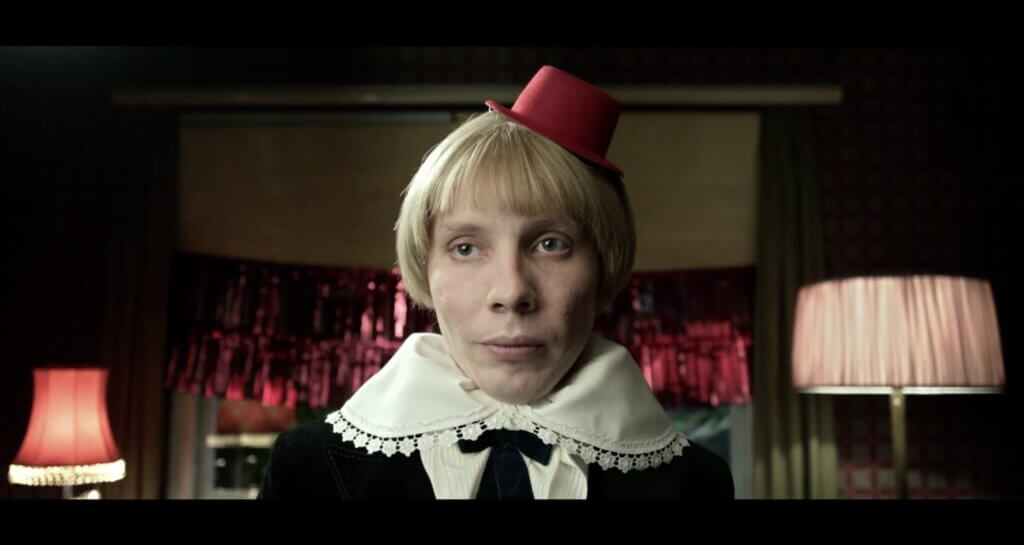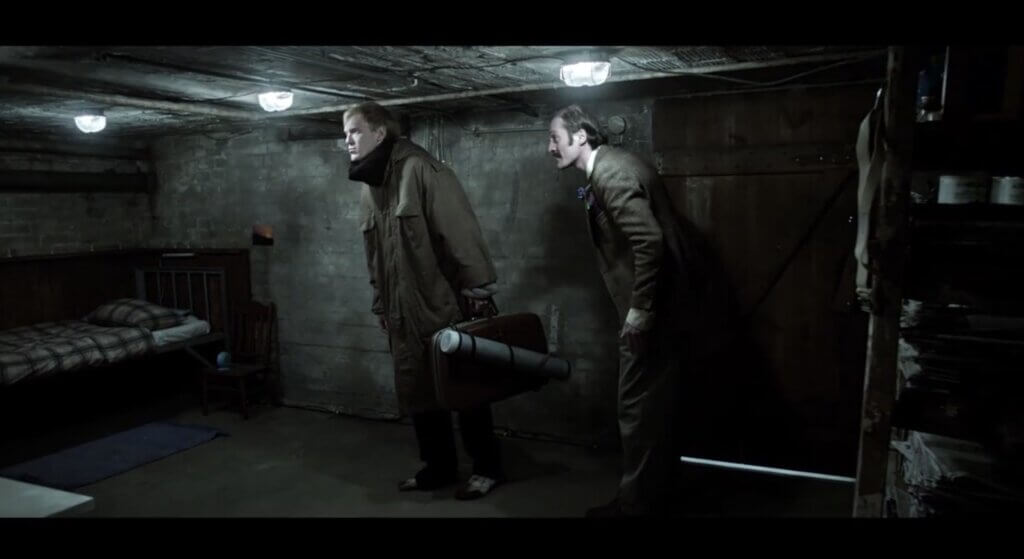Review: Der Bunker (2015), Where Humor, Horror, and Surrealism Collide
If you were to explain the plot of Nikias Chryssos’ Der Bunker (2015) to a friend, they might think you were describing a weird fever dream you had rather than an actual film. The plot centers on a young man (Pit Bukowski), known only as “The Student,” who agrees to live with a family in a remote house to work on making a scientific breakthrough related to the Higgs boson, sometimes referred to as the “God Particle.” However, upon arriving at his new winter retreat, he is disappointed to find that it is not, in fact, an idyllic waterfront room with a view, but rather a windowless bunker in the middle of nowhere. To make things more complicated, the husband and wife who own the bunker are peculiar, to say the least.
When the Student pays the Father (David Scheller) a seemingly paltry sum for his stay, the Father declares that the Student can help out around the house to pay off his debts. Later, when the Father and Mother (Oona von Maydell) sit down to have a meal with the Student, the Father records the Student’s consumption of an additional dumpling and several napkins. He later uses this as proof of the Student’s greediness. As a result, the Student must do whatever he can to pay off his debts.
Around this time, we are introduced to the most darkly humorous character of the story: Klaus (played by Daniel Fripan, an actor in his mid-30s at the time of filming). According to the Mother and Father, Klaus is just 8 years old, but, despite adopting the demeanor and clothing of a child, he looks much, much older. His parents, frustrated that Klaus is not advancing in his studies, ask the Student to replace the Father as Klaus’ new tutor. The Student would prefer to spend time on his work, which he insists requires “absolute concentration,” but he is eventually strong-armed into placing the “boy” under his tutilage.
The Student and Klaus have very awkward interactions at first, as it becomes abundantly clear that the Mother and Father have kept Klaus from experiencing normal life. He is unfamiliar with the act of “playing” and his knowledge of various subjects implies questionable teaching methods on the part of the Father. Though the Student is initially frustrated with Klaus’ ineptitude and naivety, he eventually grows to pity Klaus and the surreal, claustrophobic environment in which he has been brought up. Nonetheless, in order to show the Mother and Father that Klaus is making progress, the Student is resigned to use a wooden cane and violence (a suggestion from the Father) to force Klaus to memorize every country’s capital. The Mother and Father are delighted by Klaus’ newfound knowledge, and they insist that he will one day become president of the United States.
For his birthday, Klaus sings “Happy Birthday” to himself, much in the way that Marylin Monroe sang to JFK.

Meanwhile, the Mother, who shows an uncomfortable attraction to the Student, reveals that there is some kind of entity living in an open wound on her leg. The entity gives her instructions on how to bring up Klaus and what to do about both the Father and the Student. With time, the Student and the Mother develop a sexual relationship, which seems to help the Student make progress in his work. However, as the Student becomes increasingly skeptical of the parents and their treatment of Klaus, he endeavors to free Klaus, leading to a series of surreal and violent clashes.
The plot sounds strange enough on its own, but I have failed to mention some of the most bizarre and unsettling elements. For “fun,” the family gathers in the living room, where the Father puts on clownish makeup and reads bad jokes from a book of puns, much to the delight of Klaus, who has virtually no other outlets for entertainment. While Klaus appears to be an adult and eats regular food, he is also breastfed by the Mother. To make things even weirder, the family celebrates Klaus’ birthday by dressing him up in old-fashioned clothing and having him sing “Happy Birthday” to himself (as president), much in the fashion that Marylin Monroe famously sang to JFK.
Though he possesses very little agency in his own right, Klaus steals the show. It is both hilarious and extremely unsettling to see adult actor Daniel Fripan play an 8-year-old boy. Whether he is actually supposed to be eight or this is just a lie crafted by his parents is never made clear. But either way, Klaus is a strange little man-boy. From the ridiculous bowl haircut to his undersized pajamas, Klaus helps bring a bizarre sense of life to an otherwise decaying environment.
Despite making you uncomfortable every step of the way, Der Bunker is a beautiful piece of Surrealist Cinema.

However, it is the way in which Klaus is raised that often makes you feel uneasy and, in some cases, terrified. Though the surrealist foundation helps lighten some of the horrific elements, if taken in a literal sense, Klaus is nothing short of a prisoner, with two psychotic wardens. His story would be a child services case that you might see on the nightly news. Thus, while Klaus often helps lift the mood and bring humor to the whole thing, his circumstances create a much darker ambiance.
Despite making you (as a viewer) uncomfortable every step of the way, Der Bunker is a beautiful piece of Surrealist Cinema. It is set in a dreary, poorly lit bunker, and yet every shot is executed with exquisite precision and visual appeal. The photography alone helps undermine some of the plot’s most dark and unseemly elements, while (somewhat ironically) amplifying moments of horror and “perversion.” It is truly a film of constant contradictions, where every look, every word, and every action mean something and nothing all at once.
Der Bunker (2015) Movie Rating: ★★★★½ out of 5
When it is all said and done, there’s little I can write against the film. I have not always been a huge fan of intensely surreal films, in which producing dreamlike images supersedes all other film elements, like coherent plot progression, character development, and so on. Fortunately, Nikias Chryssos finds the perfect balance between quality storytelling and surrealist eccentricity with Der Bunker. So, if you have the patience and fortitude to feel uncomfortable, confused, amused, and horrified, Der Bunker is most definitely the perfect film for you.
If you’d like to watch Der Bunker (2015), it is currently available to stream, rent, or purchase on Shudder or Amazon Prime. For more film reviews like this one, be sure to check out the Philosophy in Film homepage!

